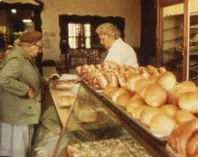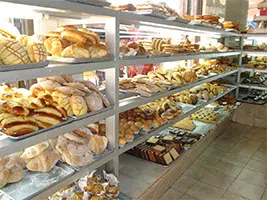 The premises where bread is produced and/or sold is known as a bakery . The term also refers to the job of the subject dedicated to the production of this product.
The premises where bread is produced and/or sold is known as a bakery . The term also refers to the job of the subject dedicated to the production of this product.
It should be noted that bread is a food that is prepared by cooking a dough of flour , water and, usually, yeast . From this basic recipe, you can include multiple ingredients and obtain different kinds of breads.
It is estimated that human beings began to produce bread thousands of years before Christ , when they stopped being nomadic and became sedentary. Although the exact time of its creation is not known, it is estimated that it took place approximately 12 thousand years ago. Regarding bakeries, there were many in Ancient Rome .
Starting in the Middle Ages , bakeries began to incorporate ovens . In fact, the bread recipe has gone through several drastic changes throughout history: at first it was a dry, hard and bitter product, which had to be immersed in boiling water before being consumed.
Returning to the history of the first bakeries, there are those who point to the 2nd century BC. C. in Rome, but also those who suggest that the sale of bread to the public had been invented by the ancient Egyptians. In 2002, a group of researchers from North America claimed to have found the archaeological remains of a bakery from 3000 BC. C., in the Jariya Oasis .
Nowadays there are various types of bakeries, since some have ovens but others limit themselves to selling bread that is made in other places.
We can, therefore, find independent bakeries that have their own oven and that generally specialize in some particular breads. On the other hand, there are bakeries that sell the products generated by a factory: they are not dedicated, in this way, to production.
There are also franchises that prepare bread following a specific recipe and respecting pre-established formulas. These stores constitute chains whose members offer the same options to consumers in all their establishments.
 In stores belonging to a franchise, the products are not always prepared, but in many cases the production is centralized in a factory and then a delivery process is carried out that covers each and every one of the associated establishments. This tactic is the one that offers the greatest stability in terms of quality and flavor of the products, since they all come from the same place.
In stores belonging to a franchise, the products are not always prepared, but in many cases the production is centralized in a factory and then a delivery process is carried out that covers each and every one of the associated establishments. This tactic is the one that offers the greatest stability in terms of quality and flavor of the products, since they all come from the same place.
It should be noted that many bakeries also make pastry products. Thus, along with the breads they present cakes or pastries; cakes; bills or buns; and other proposals. They can even make certain savory foods such as sandwiches and empanadas available to their customers.
One of the characteristics that usually differentiates bakeries that make their own products from those that receive them from external distributors is that the former can sell hot bread, fresh from the oven, with its crust especially crispy and its crumb at its moistest and spongy. Few things compare to the pleasure of eating freshly made bread, despite the simplicity of its recipe.
Just as bread is a fundamental element in the diet of many cultures , bakery is also fundamental and occupies a symbolic place beyond its nutritional function. Many people get up first thing in the morning to go buy bread, as if it were a rite that they must complete in order to start their day with good fortune. Going to buy bread is a characteristic daily activity in many cities around the world.
